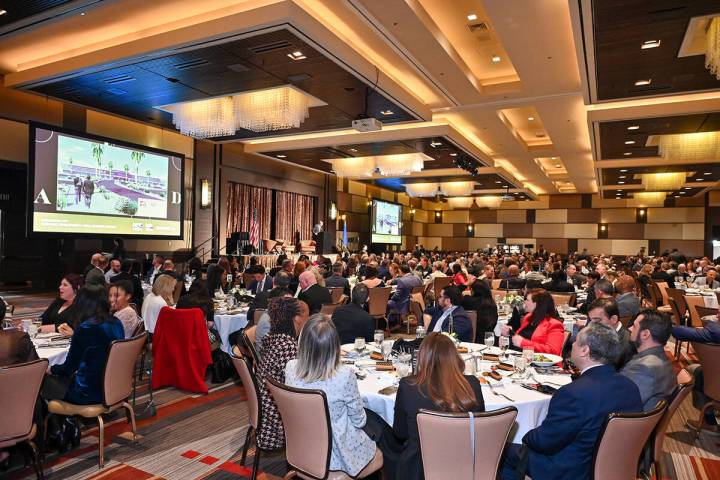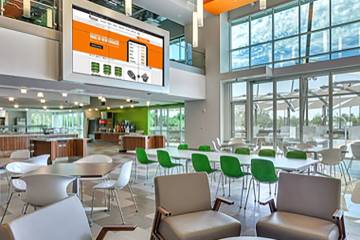Dominic Ng sees the manufacturing job growth potential in Nevada. His one big concern and advice is that the state needs to improve its educational system to make that happen.
Ng is chairman and CEO of Southern California-based East West Bank, which opened a branch in Las Vegas two years ago. He said there’s no reason why top line Chinese manufacturers and other companies can’t make Southern Nevada their home.
Ng simply points to the Haier Group, a Chinese multinational consumer electronics and home appliances company that selected South Carolina to produce appliances for American consumers.
“If there were better alternatives, I’m pretty much sure they would rather be in Vegas than South Carolina,” Ng said of Chinese companies’ preference for a West Coast hub.
In December, Faraday Future, whose financial backer is a Chinese billionaire, announced it’s building a $1 billion auto plant in North Las Vegas to produce electric cars. Many Chinese business executives prefer a West Coast base, but California is not an option with high labor costs, land costs and litigation costs, he said.
“Faraday is the tip of the iceberg,” Ng said. “I think there will be more coming. China’s labor costs have risen to the point where they are unsustainable. Their labor costs are now close to us. In addition the land costs are higher than California, and it’s completely insane to go to those cities and build a manufacturing plant.”
The question is how much can Nevada grab from Georgia, North Carolina, South Carolina and Tennessee, Ng said. It will happen but it will take time and executives need their level of awareness of Nevada increased, he said.
“At this point, those states are getting all of the business. There are so many U.S. plants in South Carolina and North Carolina that are owned by Chinese major manufacturing companies,” Ng said. “Nevada is not getting much. In the past, if you want to have a good time, then you go to Las Vegas. People don’t think about Las Vegas being a great alternative to North Carolina and South Carolina.”
Whether it’s making solar panels, electric cars or other electronics, Ng said there’s incentive to make products in the U.S. and ship them to other states and save on transportation costs from China.
“The transportation costs that they save would exceed labor costs in China,” Ng said.
Ng said that while Southern Nevada may not have the labor pool that a South Carolina has to draw from to lure manufacturers, he added that could quickly change if a company relocated.
“Laborers that live in L.A. and San Francisco — they make $60,000 to $70,000 a year — and if you include both husband and wife it adds up to $140,000,” Ng said. “That sounds like a pretty good number, but in L.A. and San Francisco, it’s getting so expensive. Suddenly, they go to Vegas and with $140,000 I can buy a nice three bedroom.”
But for all the state is doing to lure business such as tax credits and other incentives to lure manufacturing plants, more needs to be done to improve an educational system that makes people want to relocate to Las Vegas, Ng said.
“There’s not enough strong education alternatives,” Ng said. “For a CEO or entrepreneur to say, ‘I will establish my base in Las Vegas and push to do big business in Las Vegas,’ Vegas needs to look at its educational system, and it’s a challenge. If that is available, there would be money pouring in from China. As you know, every Chinese investor is always looking at their children’s education as a high priority. They are willing to pay tax at a high premium for it. Somehow my impression by talking to those who are making a decision about should they or should they not are always complaining about the education system. It is not at the quality they would expect it to be.”
Simply having high-cost private schools as an alternative isn’t enough to educate the children of most of a company’s workforce, Ng said.
“To create new jobs, you need that 45-to-50 year-old guy who has a 12- or 13-year-old, and says I’m packing up and going to Las Vegas. Whether private or public school, it’s not just for the CEO, who can always afford to go to a private school, but he needs to make sure his middle-level managers send their children to public school and that they are strong enough to make it compelling to make them move.”
Ng, a Pasadena, California, resident, said while he’s optimistic about Las Vegas’ future, he said even as an outsider he believes it is important to make suggestions on how the region can be stronger. That way everyone benefits, he said.






